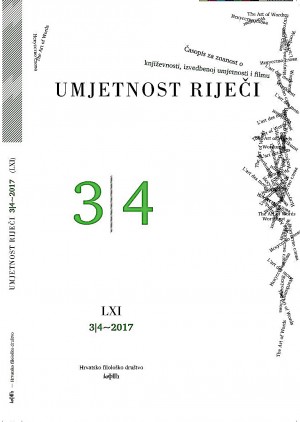PROMJENA KNJIŽEVNOPOVIJESNOGA NARATIVA O DRUGOJ POLOVICI 19. STOLJEĆA: PRIMJER INTERPRETACIJE PRIPOVJEDNE PROZE SIMONA JENKA
THE SHIFT OF LITERARY HISTORICAL NARRATIVE IN THE SECOND HALF OF THE 19TH CENTURY: THE CASE OF INTERPRETATION OF SIMON JENKO’S PROSE
Author(s): Blaž KavšekSubject(s): Slovenian Literature, 19th Century, Theory of Literature
Published by: Hrvatsko filološko društvo
Keywords: France Bernik; Matjaž Kmecl; Slovenian Realism; postromanticism; periodization;
Summary/Abstract: Simon Jenko, primarily known as a poet, published five short stories between 1857 and 1858. One (Predpustnica/The Carnival) was published in 1857 in Venec and four of them in 1858: one of those in Vaje (Kaznovana tercijalka/A Punished Bigoted Woman) and three, the most prominent ones, in Janežič’s Slovenski glasnik (Spomini/Memories, Tilka, and Jeprški učitelj/The Teacher from Jeprca). Jenko’s prose is analysed in greater detail by Matjaž Kmecl (1973) and France Bernik (1956). The critics interpret one of the stories, Spomini (Memories), from a completely different standpoint: Kmecl interprets it as the product of Jenko’s romantic bourgeois ideology influenced by European Romantic movements, and Bernik as the culmination of Jenko’s loyalty to realism or even as “counter-Romanticism”. Since the critics’ understanding of what romantic and realist implies is epistemologically so different, it seems unproductive to simply oppose their views. Hence, this paper contextualises the critics’ implicit conceptions of romantic and realist with two distinct literary historical traditions and narratives from the second half of the 19th century.
Journal: Umjetnost riječi
- Issue Year: 2020
- Issue No: 3-4
- Page Range: 245-262
- Page Count: 17
- Language: Croatian

